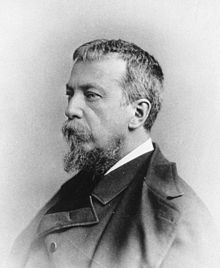"Show me the books he loves and I shall know
The man far better than through mortal friends."
— S. Weir Mitchell
 Neurologist and novelist Silas Weir Mitchell (1829-1914) was one of the most
prominent American physicians of the late 19th century and early 20th centuries,
publishing 25 accounts and papers based on his extensive experimentations on
animals in the 1850s alone.
Neurologist and novelist Silas Weir Mitchell (1829-1914) was one of the most
prominent American physicians of the late 19th century and early 20th centuries,
publishing 25 accounts and papers based on his extensive experimentations on
animals in the 1850s alone.
During the Civil War he worked as a surgeon in the Union Army, treating nervous
cases at Turner's Lane Military Hospital in Philadelphia (even though he had no
experience in neurology up to that point). He published a number of
publications following this period, one of these was 'Gunshot Wounds', which
featured the first descriptions of phantom limb, ascending neuritis and
erythromelalgia (the 'burning pain', also known as Mitchell's disease).
He is arguably best known for establishing a rest cure as a method of treating
patients, especially women, suffering from hysteria - the cure became the
standard treatment for many decades, particularly in England.
Weir Mitchell was something of a character. In appearance his gaunt features and
bearded face caused some to liken him to 'Uncle Sam'. He was a superb
conversationalist and his humor and personality gave him a wide range of
friends. He was famous for his sometimes eccentric approach to patients.
For example one story (possibly exaggerated with time) tells how he was
confronted with a lady who believed she was dying. Having tried all the
tricks he knew to induce her to leave her bed, he threatened her with rape and
commenced to undress. He got to his undergarments when the woman fled the room screaming!
From the 1880s onwards he devoted his attention to writing novels and poetry.
His most popular novels were Hugh Wynne (1897) and The Adventures of Francois (1898). In his later years his fame as a man of letters equaled his reputation as a physician, and he traveled extensively in the USA and overseas giving speeches - but always returning to Philadelphia where he was born and died.
Image from The History of Medicine (NLM), 1881
This quote & biography originally ran in an issue of BookBrowse's membership magazine. Full Membership Features & Benefits.
Analyzing humor is like dissecting a frog. Few people are interested and the frog dies of it.
Click Here to find out who said this, as well as discovering other famous literary quotes!
Your guide toexceptional books
BookBrowse seeks out and recommends the best in contemporary fiction and nonfiction—books that not only engage and entertain but also deepen our understanding of ourselves and the world around us.